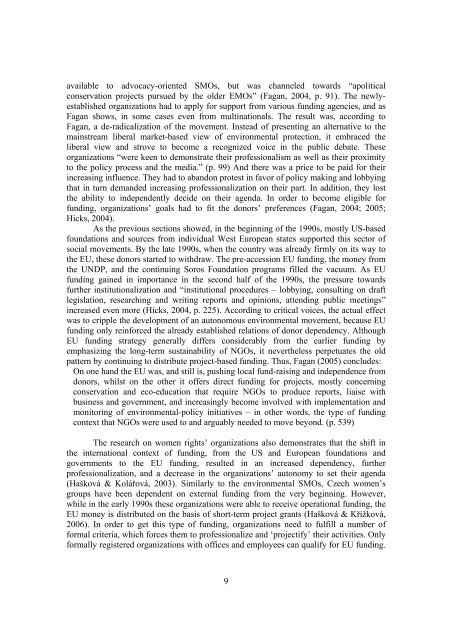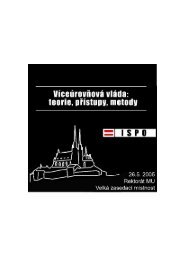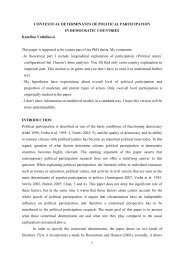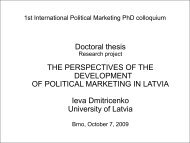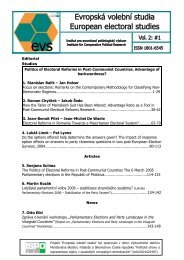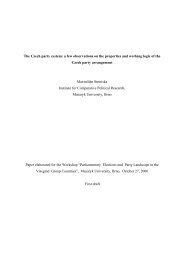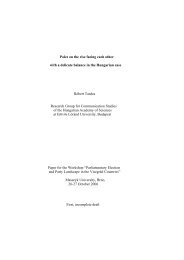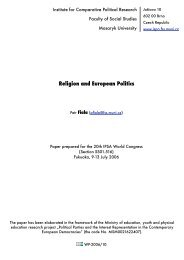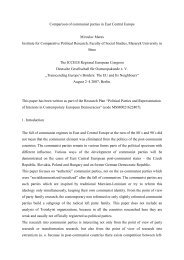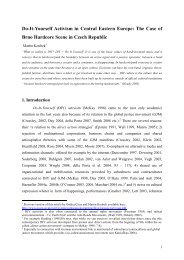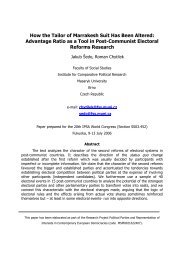Ãvodnà poznámka: PÅedložený text je pracovnà verzà zamýšleného ...
Ãvodnà poznámka: PÅedložený text je pracovnà verzà zamýšleného ...
Ãvodnà poznámka: PÅedložený text je pracovnà verzà zamýšleného ...
Create successful ePaper yourself
Turn your PDF publications into a flip-book with our unique Google optimized e-Paper software.
available to advocacy-oriented SMOs, but was channeled towards “apoliticalconservation pro<strong>je</strong>cts pursued by the older EMOs” (Fagan, 2004, p. 91). The newlyestablishedorganizations had to apply for support from various funding agencies, and asFagan shows, in some cases even from multinationals. The result was, according toFagan, a de-radicalization of the movement. Instead of presenting an alternative to themainstream liberal market-based view of environmental protection, it embraced theliberal view and strove to become a recognized voice in the public debate. Theseorganizations “were keen to demonstrate their professionalism as well as their proximityto the policy process and the media.” (p. 99) And there was a price to be paid for theirincreasing influence. They had to abandon protest in favor of policy making and lobbyingthat in turn demanded increasing professionalization on their part. In addition, they lostthe ability to independently decide on their agenda. In order to become eligible forfunding, organizations’ goals had to fit the donors’ preferences (Fagan, 2004; 2005;Hicks, 2004).As the previous sections showed, in the beginning of the 1990s, mostly US-basedfoundations and sources from individual West European states supported this sector ofsocial movements. By the late 1990s, when the country was already firmly on its way tothe EU, these donors started to withdraw. The pre-accession EU funding, the money fromthe UNDP, and the continuing Soros Foundation programs filled the vacuum. As EUfunding gained in importance in the second half of the 1990s, the pressure towardsfurther institutionalization and “institutional procedures – lobbying, consulting on draftlegislation, researching and writing reports and opinions, attending public meetings”increased even more (Hicks, 2004, p. 225). According to critical voices, the actual effectwas to cripple the development of an autonomous environmental movement, because EUfunding only reinforced the already established relations of donor dependency. AlthoughEU funding strategy generally differs considerably from the earlier funding byemphasizing the long-term sustainability of NGOs, it nevertheless perpetuates the oldpattern by continuing to distribute pro<strong>je</strong>ct-based funding. Thus, Fagan (2005) concludes:On one hand the EU was, and still is, pushing local fund-raising and independence fromdonors, whilst on the other it offers direct funding for pro<strong>je</strong>cts, mostly concerningconservation and eco-education that require NGOs to produce reports, liaise withbusiness and government, and increasingly become involved with implementation andmonitoring of environmental-policy initiatives – in other words, the type of fundingcon<strong>text</strong> that NGOs were used to and arguably needed to move beyond. (p. 539)The research on women rights’ organizations also demonstrates that the shift inthe international con<strong>text</strong> of funding, from the US and European foundations andgovernments to the EU funding, resulted in an increased dependency, furtherprofessionalization, and a decrease in the organizations’ autonomy to set their agenda(Hašková & Kolářová, 2003). Similarly to the environmental SMOs, Czech women’sgroups have been dependent on external funding from the very beginning. However,while in the early 1990s these organizations were able to receive operational funding, theEU money is distributed on the basis of short-term pro<strong>je</strong>ct grants (Hašková & Křížková,2006). In order to get this type of funding, organizations need to fulfill a number offormal criteria, which forces them to professionalize and ‘pro<strong>je</strong>ctify’ their activities. Onlyformally registered organizations with offices and employees can qualify for EU funding.9


